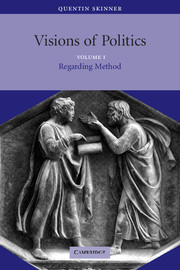Book contents
- Frontmatter
- Contents
- General preface
- Full Contents: Volumes 1–3
- Acknowledgements
- Conventions
- 1 Introduction : Seeing things their way
- 2 The practice of history and the cult of the fact
- 3 Interpretation, rationality and truth
- 4 Meaning and understanding in the history of ideas
- 5 Motives, intentions and interpretation
- 6 Interpretation and the understanding of speech acts
- 7 ‘Social meaning’ and the explanation of social action
- 8 Moral principles and social change
- 9 The idea of a cultural lexicon
- 10 Retrospect : Studying rhetoric and conceptual change
- Bibliography
- Index
10 - Retrospect : Studying rhetoric and conceptual change
Published online by Cambridge University Press: 05 September 2012
- Frontmatter
- Contents
- General preface
- Full Contents: Volumes 1–3
- Acknowledgements
- Conventions
- 1 Introduction : Seeing things their way
- 2 The practice of history and the cult of the fact
- 3 Interpretation, rationality and truth
- 4 Meaning and understanding in the history of ideas
- 5 Motives, intentions and interpretation
- 6 Interpretation and the understanding of speech acts
- 7 ‘Social meaning’ and the explanation of social action
- 8 Moral principles and social change
- 9 The idea of a cultural lexicon
- 10 Retrospect : Studying rhetoric and conceptual change
- Bibliography
- Index
Summary
I have been concerned in several of the previous chapters with the prospect of treating the study of changing concepts as a distinct form of historical enquiry. As I have sought to stress, if we wish to write this kind of history it seems to me that we shall do well to concentrate in particular on the concepts we employ to describe and appraise what Hobbes called our artificial world, the world of politics and morality. This in turn means that we shall need to focus on the various terms – the entire normative vocabulary – in which such concepts are habitually expressed. As I argued in chapters 8 and 9, these terms, the paradigms of which are the names of the virtues and vices, are those which perform evaluative as well as descriptive functions in natural languages. They are basically used to describe actions and the motives for which they are performed. But if the criteria for applying one or other of these terms can plausibly be claimed to be reflected in some given action or state of affairs, then the application of the term serves not only to describe but at the same time to evaluate it.
I began to make such normative vocabularies a subject of my own historical research in the 1970s, and it was during those years that the original versions of chapters 8 and 9 were published.
- Type
- Chapter
- Information
- Visions of Politics , pp. 175 - 187Publisher: Cambridge University PressPrint publication year: 2002
- 5
- Cited by



